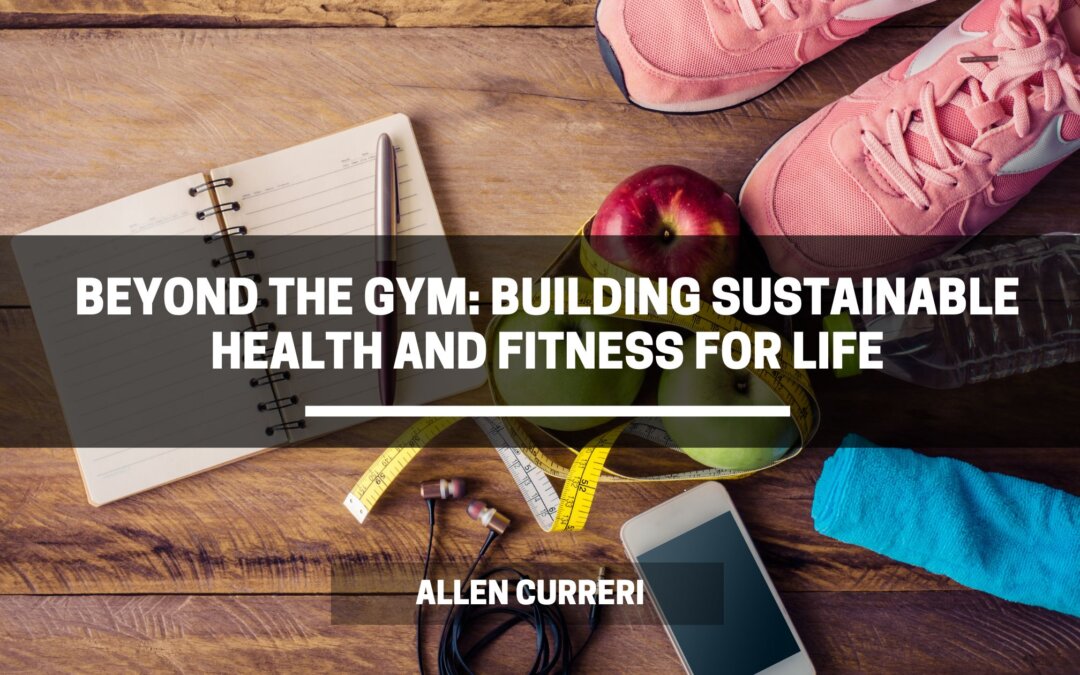
Beyond the Gym: Building Sustainable Health and Fitness for Life
Health and fitness are often portrayed through extremes — intense workouts, restrictive diets, rapid transformations. Yet sustainable wellness is not built through short-term intensity. It is cultivated through consistent habits, balanced routines, and a mindset focused on longevity rather than quick results.
True fitness extends far beyond appearance. It influences energy, mental clarity, resilience, and overall quality of life.
Redefining Fitness
Fitness is not limited to athletic performance or aesthetic goals. It encompasses cardiovascular endurance, muscular strength, flexibility, mobility, and mental well-being.
A holistic approach recognizes that physical and mental health are deeply interconnected. Exercise has been shown to reduce stress, improve mood, and enhance cognitive function. Regular movement supports heart health, bone density, and metabolic efficiency.
When viewed through a long-term lens, fitness becomes an investment in future vitality.
The Power of Consistency
One of the most common barriers to sustained health is inconsistency. Many individuals adopt intense routines that are difficult to maintain. Burnout follows, leading to cycles of motivation and relapse.
Sustainable fitness emphasizes realistic, repeatable habits. Moderate exercise performed consistently is more effective than extreme regimens abandoned after a few weeks.
Small, daily improvements compound over time. Walking regularly, incorporating strength training twice a week, and maintaining balanced nutrition create meaningful progress without overwhelming pressure.
Nutrition as Foundation
Exercise alone cannot compensate for poor nutrition. Balanced eating habits provide the energy and nutrients necessary for performance and recovery.
Rather than focusing on restrictive dieting, sustainable nutrition prioritizes whole foods, adequate protein intake, hydration, and mindful portion control.
Flexibility is equally important. Allowing occasional indulgences without guilt prevents unhealthy relationships with food and supports long-term adherence.
Mental Health and Movement
Physical activity plays a critical role in mental well-being. Exercise stimulates endorphin release, reduces anxiety, and improves sleep quality.
Incorporating mindfulness practices — such as yoga, stretching, or breathwork — enhances stress management and body awareness.
Mental resilience built through consistent physical effort often carries into other areas of life, strengthening confidence and discipline.
Recovery and Rest
Recovery is frequently overlooked but essential. Muscles rebuild during rest, not during workouts. Sleep supports hormone regulation, immune function, and cognitive performance.
Overtraining can lead to injury, fatigue, and diminished motivation. Balanced routines incorporate rest days and prioritize quality sleep.
Long-Term Perspective
Sustainable fitness is not about achieving a short-term milestone; it is about maintaining health for decades. Aging well requires maintaining muscle mass, cardiovascular strength, and mobility.
The goal shifts from rapid transformation to lifelong capability — being able to move freely, stay active, and maintain independence.
Health and fitness are not temporary projects. They are ongoing commitments to well-being. When approached with balance, patience, and consistency, fitness becomes less about drastic change and more about daily empowerment.
True strength is not measured by intensity alone — it is measured by sustainability. And sustainable health is one of the most valuable investments anyone can make.

Navigating the Regulatory Maze: Medical Device Approval in Europe vs. the United States
Bringing a medical device to market is not just a scientific or engineering challenge — it is a regulatory journey that demands precision, strategy, and deep understanding of evolving global frameworks. For companies seeking to commercialize in both Europe and the United States, navigating regulatory pathways can feel like crossing two distinct, complex landscapes.
Although both regions share the goal of ensuring patient safety and product effectiveness, their regulatory approaches differ significantly in structure, process, and oversight.
The U.S. Framework: FDA Oversight and Structured Pathways
In the United States, medical devices are regulated by the Food and Drug Administration (FDA), specifically under the Center for Devices and Radiological Health (CDRH). Devices are categorized into three classes based on risk:
- Class I (low risk) – subject to general controls
- Class II (moderate risk) – often requiring 510(k) clearance
- Class III (high risk) – requiring Premarket Approval (PMA)
The 510(k) pathway allows manufacturers to demonstrate that their device is “substantially equivalent” to a legally marketed predicate device. This pathway can be faster and less costly than PMA, which requires extensive clinical data to prove safety and effectiveness.
Clinical evidence expectations in the U.S. are generally well-defined. The FDA provides structured guidance documents, pre-submission programs, and direct feedback mechanisms to help companies prepare robust applications.
However, timelines can be lengthy, particularly for novel or high-risk devices. Post-market surveillance and reporting requirements also remain stringent, with manufacturers obligated to monitor adverse events and maintain compliance with Quality System Regulations (QSR).
The European Landscape: MDR and Notified Bodies
In Europe, medical devices are regulated under the Medical Device Regulation (MDR) (EU 2017/745), which replaced the former Medical Device Directive (MDD). MDR significantly strengthened requirements for clinical evidence, traceability, and post-market surveillance.
Unlike the centralized FDA model, Europe relies on Notified Bodies — independent organizations designated by EU member states — to assess device conformity before CE marking.
Devices are classified into four categories: Class I, IIa, IIb, and III, depending on risk level. Higher-risk devices require more rigorous clinical evaluation and review.
One major shift under MDR is the heightened emphasis on clinical data and post-market clinical follow-up (PMCF). Manufacturers must demonstrate ongoing safety and performance through continuous data collection.
Additionally, the European Database on Medical Devices (EUDAMED) aims to enhance transparency and traceability across the EU market.
Key Differences Between the U.S. and Europe
While both systems prioritize patient safety, differences include:
- Centralization: The FDA operates as a single regulatory authority, while Europe uses multiple Notified Bodies.
- Clinical Evidence Expectations: MDR has significantly increased clinical data requirements, sometimes making European approval more demanding than in the past.
- Post-Market Surveillance: Both regions emphasize monitoring, but MDR introduces expanded reporting and lifecycle documentation obligations.
- Timeline Variability: U.S. timelines are structured but can be lengthy; European timelines may vary depending on Notified Body capacity.
Strategic Considerations for Manufacturers
Companies must decide which market to enter first, often weighing regulatory predictability, speed to market, and commercial opportunity.
Historically, Europe offered faster approval timelines, but MDR implementation has created bottlenecks due to limited Notified Body capacity. Meanwhile, the FDA’s Breakthrough Devices Program offers expedited pathways for innovative technologies addressing unmet medical needs.
Regulatory strategy should be integrated early into product development. Clinical trial design, documentation standards, and risk management processes must align with the requirements of both jurisdictions.
The Importance of Regulatory Intelligence
Regulatory frameworks are not static. Guidance evolves, interpretations shift, and new policies emerge. Companies must maintain ongoing regulatory intelligence and cross-functional collaboration between research, quality assurance, and compliance teams.
Failure to anticipate regulatory changes can lead to costly delays or market withdrawal.
Successfully navigating medical device regulation in Europe and the U.S. requires more than compliance — it demands foresight, planning, and adaptability. As standards continue to evolve, companies that invest in strong regulatory strategy will not only achieve approval but also build long-term credibility and trust in global healthcare markets.
In the world of medical devices, innovation may begin in the lab — but approval is earned through regulation.

From Lab to Locker Room—How Research and Regulation Shape the Future of Health & Fitness Devices
Behind every smart wearable is a story of science, scrutiny, and compliance.
The health and fitness market thrives on innovation—smarter wearables, AI-driven diagnostics, and personalized health insights. But before these devices ever reach a gym bag or wrist, they undergo a rigorous journey shaped by scientific research and regulatory oversight.
Understanding how research and regulation intersect is key to predicting where the industry is headed.
The Role of Research: More Than Just Data
Modern medical devices—especially fitness-related ones—are built on layers of research:
- Preclinical testing to validate safety
- Clinical investigations to support performance claims
- Human factors research to ensure usability
In both Europe and the U.S., regulators increasingly expect real-world evidence (RWE). Data collected from everyday users—outside controlled trials—is now influencing approvals, labeling, and post-market obligations.
This shift is particularly relevant for fitness devices, which naturally generate continuous streams of user data.
Regulation Is Driving Better Science
Contrary to popular belief, regulation doesn’t stifle innovation—it often improves it.
- In the U.S., FDA initiatives like the Digital Health Software Precertification Program encourage agile development while maintaining safety standards.
- In Europe, MDR mandates continuous clinical evaluation, pushing manufacturers to invest in long-term research rather than one-time studies.
The result? Devices that are not only smarter, but also safer and more reliable.
Health & Fitness Devices Are Under a New Lens
Historically, many fitness products avoided strict regulation by positioning themselves as “wellness tools.” That distinction is disappearing.
Today, claims related to:
- Heart health
- Sleep disorders
- Stress and mental well-being
- Metabolic performance
can trigger medical device classification.
Manufacturers must now back these claims with robust clinical data, validated algorithms, and transparent performance metrics.
Challenges for Innovators and Startups
While large corporations can absorb regulatory complexity, startups often struggle with:
- Costly clinical studies
- Evolving regulatory guidance
- Cross-border compliance requirements
However, companies that integrate regulatory strategy early—alongside research and product design—are far more likely to succeed.
The Future: Smarter Regulation for Smarter Devices
Regulators on both sides of the Atlantic are adapting:
- Increased acceptance of AI and machine learning models
- Expanded use of adaptive clinical trials
- Greater reliance on post-market performance data
This evolution signals a future where regulation and research work in tandem, accelerating safe innovation rather than slowing it down.
Final Thoughts
The next generation of health and fitness devices will be defined not just by sleek design or advanced sensors—but by the strength of the science behind them and the regulatory frameworks that ensure trust.
For consumers, this means better protection and more reliable technology. For manufacturers, it means one thing is clear: regulatory readiness is no longer optional—it’s a competitive advantage.
About Allen Curreri
Dr. Allen Curreri lives in Mason, Ohio. He is a clinical research expert with decades of professional experience. He is a talented professional with versatile experience, but foremost, he is a community member.
Allen Curreri has been working as the Principal Investigator and Senior Medical Writer at a clinical research group. He joined the company in 2017.
He is responsible for writing and collaborating on various medical device and pharmaceutical writing projects, such as CTDs, protocol amendments, and briefing documents. He enjoys his role mentoring and managing junior medical writers.
Responsible for reviewing the clinical data of new medical devices and therapeutic drugs, he then prepares documents for submission to the FDA. His expertise in various therapeutic areas, such as oncology, orthopedics, and cardiovascular, makes him an ideal fit for his position.
Besides his commitment to his important work, Allen considers it a personal responsibility and a privilege to serve his community in every way possible. Plus, Allen knows how to have fun getting his hands dirty for a good cause! As a family man, he is particularly drawn to the work of United Way, where he has been a loyal volunteer for over fifteen years and counting. With United Way, Allen focuses on creating self-sustaining progress and strong communities. The mission? Filling the most vital gaps and providing for the most fundamental unmet needs: health, income, and education.
A long-time running and marathon enthusiast, you can often find Allen on the paths and tracks around his home, training for his next challenge. Nothing is more satisfying than taking care of yourself while working for others. Allen Curreri believes in getting out on the streets and running for a good cause in fundraisers and charity marathons.

Career Background
In 2017, Allen Curreri’s presentation was selected for presentation at the 2017 Annual Conference by the Academy of Management (AOM) – his topic was Mindfulness, Information Technology Use, and Physicians’ Performance in Emergency Rooms. Allen also maintains professional membership with multiple organizations, including the Medical Affairs Professional Society, the Regulatory Affairs Professional Society, the Society of Clinical Research Associates, and the Clinical Research Society, as well as the American Medical Writers Association and the Association of Clinical Research Professionals.
As a Clinical Research Expert, Allen Curreri has established expertise in multiple areas; these areas of skill include complex data analytics, literature review, clinical research management, clinical trial management, writing project management, regulatory affairs, regulatory writing, and medical writing. He holds his Ph.D. from Case Western Reserve University, his MBA from Georgia Southern University, and his Bachelor’s Degree from Dalton State College.
